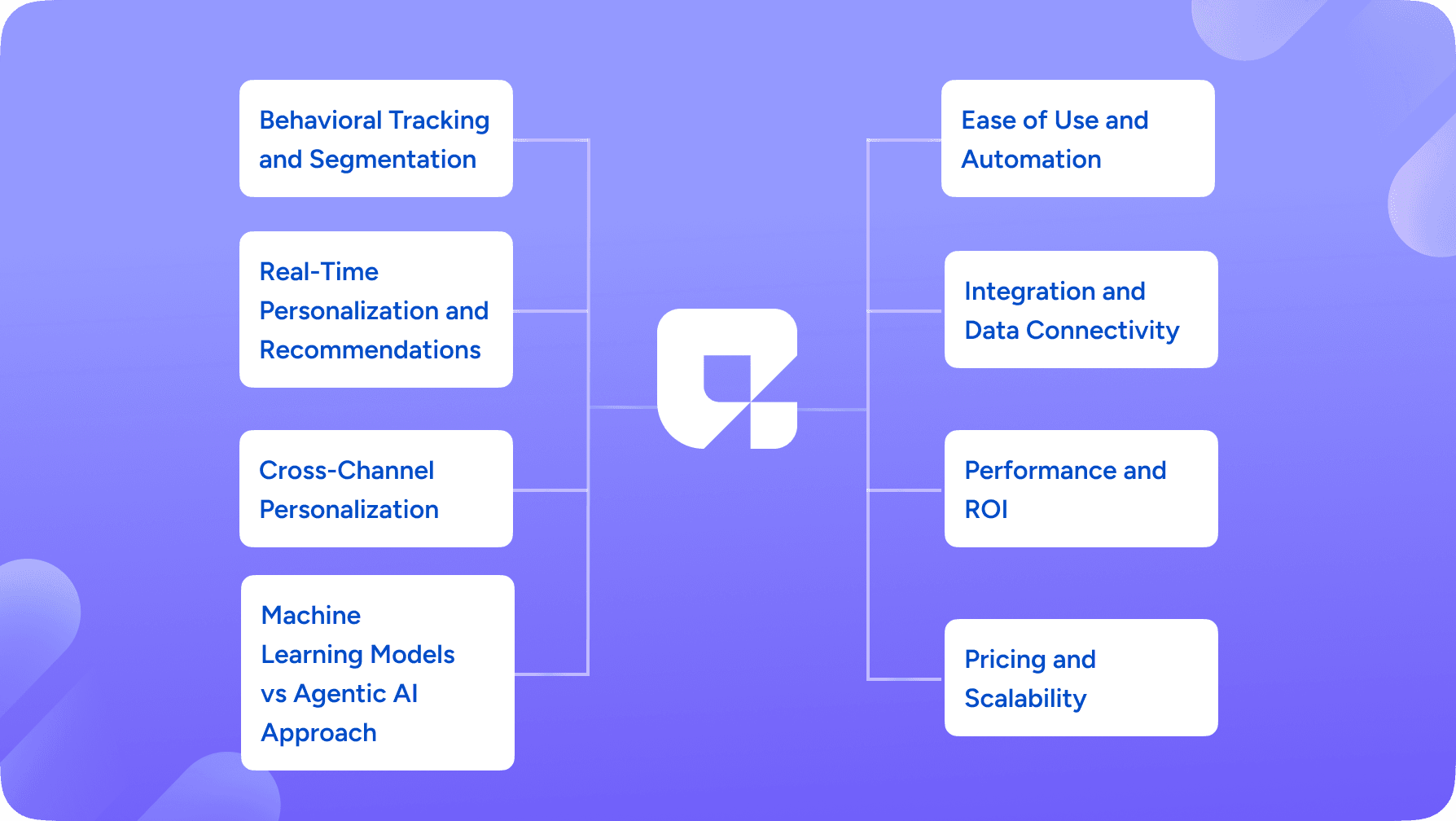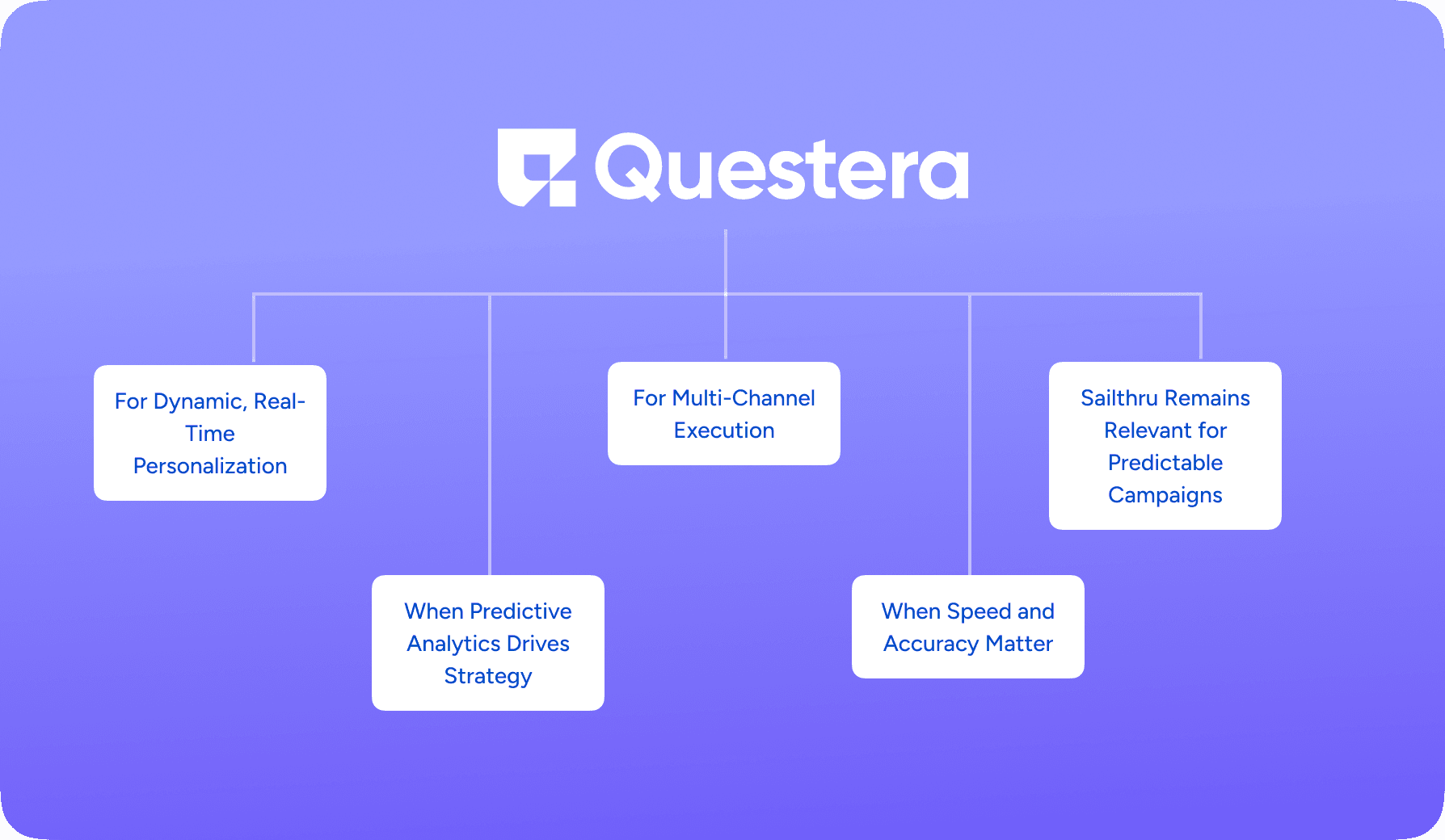Questera vs Sailthru: AI-Powered Predictive Personalization

TL;DR
- This blog compares Questera personalization vs Sailthru personalization and their approach to predictive marketing.
- Learn how Questera vs Sailthru handles behavioral tracking, real-time recommendations, and cross-channel personalization.
- Understand the difference between AI personalization vs rule-based systems and how they impact engagement.
- Explore ideal use cases for Questera personalization and when Sailthru personalization is still relevant.
- See why predictive analytics for marketing helps brands deliver faster, smarter, and more meaningful experiences.
Personalization in marketing has transformed significantly, evolving from basic email salutations to complete consumer journeys seemingly personalized for every individual. Modern brands can no longer depend on the implementation of rule-based campaigns; consumers demand messages that can immediately reflect their behavior and preferences. This is where the predictive analytics for marketing become helpful; it aids companies in predicting what a consumer wants without her clicking.
If you are evaluating Questera personalization vs Sailthru personalization, the differentiation is apparent: Questera uses agentic AI to predict and act, while Sailthru's recommendation strategy continues to use older-fashioned rules. In the world of fast-paced, digital engagement, marketers need to provide a conscientious choice of AI personalization vs rule-based systems.
A further comparison of Questera vs Sailthru details why brands will continue to shift to more intelligent solutions to simply create and deliver relevant content that resonates at each touchpoint.
People also read: Braze vs Iterable vs MoEngage: True Omnichannel Journeys
The Players: Questera vs Sailthru
When it comes to customized marketing, different platforms have unique methods. Questera personalization uses agentic AI to actively predict customer behavior and deliver content that feels inherently related. Every interaction is powered by predictive algorithms that learn from user behavior, building smart campaigns with every interaction. Sailthru personalization, in contrast, relies on a combination of historical data and its Sailthru recommendation engine to suggest content, products, and emails based on historical patterns. While useful for rule-based targeting, it is reactionary to actual customer needs rather than predictive.
The true distinction is regarding predictive analytics for marketing purposes. Questera does not just segment users; it predicts what they want next, enabling brands to automate personalized journeys that seem almost instinctual. Sailthru personalization is effective within its rules, but it is not always real-time adaptable or predictive to small behavioral changes. The comparison of AI personalization to rule-based systems is inherent and striking: Questera motivates engagement, while Sailthru adheres to predetermined rules.
For brands deciding between Questera vs Sailthru, the choice often comes down to speed, accuracy, and flexibility. Questera empowers teams to deliver dynamic, AI-driven experiences across channels, while Sailthru’s tools remain reliable for structured campaigns with predictable behaviors. By understanding how each platform handles personalization and predictive intelligence, marketers can choose a solution that truly resonates with their audience and drives measurable results.
Questera vs Sailthru: A Comparison

- Behavioral Tracking and Segmentation
When brands think about personalization, tracking user behavior is the first step. Questera personalization monitors every interaction across multiple channels, learning from clicks, views, and engagement patterns automatically. This allows marketers to create segments that reflect real-time behavior rather than relying on static lists.
On the other hand, Sailthru personalization uses the Sailthru recommendation engine to group users mostly based on historical actions and predefined rules. While this works for structured campaigns, it often lacks the flexibility to adjust to sudden behavior changes, making AI personalization vs rule-based comparisons clear for marketers seeking dynamic insights.
- Real-Time Personalization and Recommendations
Delivering the right content at the right moment separates good campaigns from great ones. Questera’s AI continuously predicts what a user wants next, updating recommendations dynamically as interactions happen.
Sailthru’s recommendation engine provides relevant content too, but it typically follows past patterns and can lag behind rapidly changing user interests. For marketers leveraging predictive analytics for marketing, Questera enables proactive engagement, whereas Sailthru often reacts after the fact.
- Cross-Channel Personalization
A truly effective platform reaches users wherever they are. Questera personalization seamlessly works across email, web, mobile apps, and push notifications, keeping messaging consistent and behavior-informed. Sailthru personalization integrates multiple channels but relies on separate rules for each, making synchronization less fluid compared to Questera’s AI-driven orchestration.
- Machine Learning Models vs Agentic AI Approach
Sailthru employs traditional machine learning models that require manual tuning and segment definitions.
Questera’s agentic AI continuously optimizes itself, identifying patterns and adjusting campaigns autonomously. This is the key distinction between AI personalization and rule-based systems.
- Ease of Use and Automation
Setting up campaigns with Questera feels intuitive because the AI handles predictions, segmentation, and content placement automatically. Sailthru requires more manual configuration, making it slower for teams to launch campaigns. Automation in Questera saves time, reducing repetitive tasks and letting marketers focus on strategy, while Sailthru personalization still relies on structured rules for campaign flow.
- Integration and Data Connectivity
Questera connects easily with multiple platforms, CDPs, and analytics tools, leveraging predictive analytics for marketing in real-time to guide actions. Sailthru integrates with common systems but often requires extra configuration for first-party data to feed its recommendation engine effectively. This gives Questera a speed advantage in turning insights into actionable campaigns.
- Performance and ROI
Metrics like engagement, conversion rates, and customer lifetime value show how each platform performs. Questera often delivers faster results through AI-driven lifecycle execution, while Sailthru personalization provides steady, predictable outcomes within rule-based limits. Case studies show Questera campaigns adapting in real-time, boosting ROI more efficiently than rule-dependent campaigns using Sailthru.
- Pricing and Scalability
Sailthru is typically priced for enterprise brands, making it less accessible for smaller teams. Questera offers scalable options suitable for startups and larger companies alike. Predictive personalization across multiple channels grows seamlessly with Questera, whereas Sailthru personalization may require additional setup and management as campaigns expand.
People also read: Braze vs Salesforce Marketing Cloud: Top Marketing Automation Tools
When to Choose Questera Over Sailthru?

For Dynamic, Real-Time Personalization
If your campaigns need to respond instantly to customer behavior, Questera personalization delivers predictive insights automatically, while Sailthru personalization relies on its Sailthru recommendation engine and rules that may lag behind user actions.
When Predictive Analytics Drives Strategy
Brands using predictive analytics for marketing benefit from Questera’s agentic AI, which anticipates behavior, adjusts campaigns autonomously, and outperforms traditional AI personalization vs rule-based setups.
For Multi-Channel Execution
If you want seamless personalization across email, web, mobile, and push notifications, Questera personalization ensures messages stay consistent, whereas Sailthru personalization requires separate configurations per channel.
When Speed and Accuracy Matter
Teams aiming to launch fast, high-impact campaigns will see better results with Questera’s automated AI-driven predictions, compared to Sailthru’s more manual, rule-dependent approach.
Sailthru Remains Relevant for Predictable Campaigns
For brands running structured, rule-based campaigns or focusing primarily on product recommendations, Sailthru personalization and its Sailthru recommendation engine still deliver reliable, steady outcomes.
Conclusion
Personalization has become the heart of modern marketing. In analyzing Questera vs Sailthru, the difference between responsive, rule-based systems and predictive, artificial intelligence driven experiences is clear. Questera personalization uses agentic AI for predicting customer behavior, real-time recommendations, and seamless multi-channel campaign orchestration.
Sailthru personalization is powered by its Sailthru recommendation engine and still performs well for structured, predictable campaigns but often lacks speed and flexibility. Brand marketers are increasingly turning to predictive analytics to drive marketing through dynamic platforms like Questera. The choice will depend on your goal, but shifting toward a focus on AI personalization vs rule-based systems is clear. Marketers adopting platforms like Questera platforms enable marketers to deliver meaningful, timely experiences that feel "personal" across all touchpoints and allow their campaigns to not only reach target audiences but also be relevant.
FAQs
1. What is the main difference between Questera personalization and Sailthru personalization?
Questera uses agentic AI to predict customer behavior in real time, while Sailthru personalization relies mostly on its recommendation engine and rule-based setups.
2. How does predictive analytics for marketing work in Questera?
Questera leverages AI to anticipate user actions, segment audiences dynamically, and deliver personalized messages automatically across multiple channels.
3. Can Sailthru still be effective for marketing campaigns?
Yes, Sailthru personalization works well for structured, rule-based campaigns and product recommendations, especially when predictable outcomes are sufficient.
4. Which platform is better for multi-channel campaigns?
Questera personalization excels at multi-channel execution, keeping messages consistent across email, web, mobile, and push notifications.
Ready to be a
10x Marketer?
See it in action












